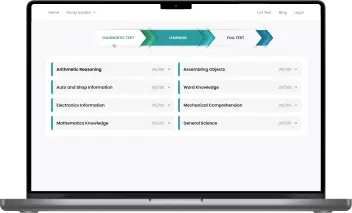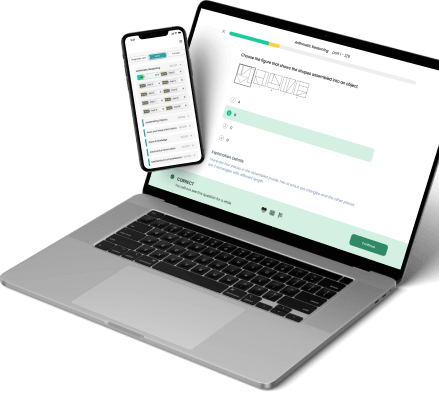Fun & effective GED practice test tool to pass with flying colors
All-in-one platform with everything you need to ace the GED on your first attempt
Clear and Thorough Learning Path
Proven GED 3-step Practice Formula
After our 100,000+ users' success stories, we developed a 3-step strategy to provide you with the most precise and in-depth learning path while minimizing your prep time.GED Diagnostic Test
First, take this short test and get your detailed report showing your strong and weak areas. Save your time by concentrating on what is in demand.Learning
With quick, bite-sized learning techniques and a detailed study guide for each GED section, you can really strengthen your weaknesses (from step 1) and boost your scores.GED Full Test
The last step for your preparation is taking our full GED practice tests and seeing how far you've come since the beginning. Repeat the 3-step formula until you are satisfied with your results!Ready to start?
Thousands of GED users already accomplished their goals.NOW it’s your turn!

What You Get

All-in-one platform
A complete GED Prep Platform, including a diagnostic test, detailed study guides for all topics, practice questions with step-by-step explanations, and various full simulator tests.
Questions nearly identical to those in the real GED test
All questions are categorized into the specific sections as on the real GED: Same format & same difficulty!
Best for the busy
Easily & quickly grasp all the knowledge with our unique learning technique. And you can learn anytime, anywhere on any devices, even with a few free minutes.
Practice while having fun
Learn and play! Complete round-by-round to reach your daily achievement and make progress on your learning journey!Featured on















What our users are saying
Over 50,000 aspiring American candidates use GED monthlyGED Test Comprehensive Guide [2024 Updated]
You can also come across the phrases "graduate equivalency degree" or "general educational diploma" while searching for information about the GED. GED traditionally stands for the General Educational Development Test.
When you graduate from high school, you will be awarded a diploma. A diploma serves as proof that you have taken all the courses needed to graduate. Some high school students come very close to graduating and receiving a diploma but fall short. In certain circumstances, students might take a set of exams to determine whether or not they have completed high school. The GED exam is referred to as this.
Would you want to learn more about obtaining a GED? You're at the correct spot, then! A GED is valuable, and we're here to help you learn more about what one is, how to get one, and how having one will improve your life in the long run. For additional details, continue reading and have a look at the article below.
What is GED Test?
General Educational Development is what people mean when they talk about getting their "GED." The General Educational Development (GED) test is an examination that measures a candidate's level of education upon completion of high school. Those who did not graduate from high school are the target audience for this program.
Your performance on the test reveals that you are knowledgeable and skilled to the same level as a high school graduate in the United States. If you are successful, you will get a certificate that is equivalent to high school graduation in terms of the opportunities it opens up for you.
What sets a General Equivalency Diploma (GED) different from a High School Diploma? You may get the GED after completing tests in four distinct disciplines. After four years of high school, students get a high school diploma as proof of their completion. The General Educational Diploma, or GED, is intended to serve as an alternative to a high school diploma. Both of these might serve as evidence that you have the skills and knowledge required to complete the 12th grade and go on to the next level.
Why Take The GED Test?
It is possible to acquire a job without a high school diploma or comparable if you question why you should complete your diploma. In certain states, the GED exam may be the primary high school equivalency test. Hundreds of thousands of individuals in the United States who did not complete high school are qualified to take the GED exam.
98% of American colleges and universities acknowledge the GED as an acceptable alternative to a high school diploma when applying for admission. The GED or comparable high school equivalency credential is accepted by all branches of the U.S. military and by most companies. In reality, the GED exam was first developed in 1942 when World War II soldiers returned to the United States, many of whom had dropped out of high school before they could graduate.
A broad range of ages and backgrounds are represented among those studying to take the GED exam. Several attendees are learning English as a second language during the event.
Many resources are available to help you prepare for the GED exam, from local adult education facilities to books that should be in your local library. A financial aid program may be provided to those who are taking the exam.
Getting started with the GED exam might be made easier by contacting your local adult education facility. Using the ZIP code finder above, locate a center in your neighborhood.
What's on the GED Test?
The GED has 4 area trials: Social Studies, Mathematics Reasoning, Science, and Reasoning Through Language Arts (RLA). These exams, which encompass areas including mathematics, reading comprehension, civics, government, history, geography, Earth science, and life science, are meant to make sure that suitable testing takers possess the same subject-area expertise as high school graduates.
Multiple-choice, fill-in-the-blank, and short response questions are all included in the computer-based assessments. The length of each exam's testing varies. The arithmetic exam lasts 115 minutes, while the science and social studies assessments last 90 minutes each. The language arts exam may be finished in 150 minutes. Depending on the state where it is granted, you could get a certificate or diploma for completing these tests.
- Mathematical Reasoning
The two primary parts of the Mathematics GED exam are algebraic and quantitative problem-solving. You will have 115 minutes to finish this test, which is slightly under 2 hours long. Quantitative questions, which require completing calculations and demonstrating how you used mathematical ideas and theories in your thinking, are given over half of that time. Algebraic problems make up the remaining 55% of the exam. Most of the test questions include a calculator option on the screen.
- Reasoning Through Language Arts (RLA)
It takes 2.5 hours to finish the GED test for Reasoning Through Language Arts. Writing and reading are the two divisions of the language arts component of the GED. This section of the exam is designed to assess your contextual understanding of the English language and English texts, as well as your writing and reading skills.
By answering an extended response question, you will need to show that you can not only comprehend factual and literary materials that are given to you but also communicate knowledge in writing. You must also demonstrate in the exam that you can deduce vocabulary definitions, the primary idea of work, and other aspects from the context of a phrase.
- Science
Questions from life, physical, earth, and space science are included in the 1.5-hour Science GED exam. Earth and space science questions make up just 20% of the examination, whereas topics related to life and physical science account for 40% of the total questions. You will also be required to answer two short-answer questions in addition to a range of selected-response questions.
To pass this specific exam, you won't need to have a strong background in science. Instead, each question will provide you with just enough background information so that you may answer it using just a basic knowledge of scientific principles. Questions on more complex topics, such as energy or anatomy, are not included.
- Social Science
Four key subjects are covered in the Social Studies GED test. Your understanding of economics, American history, civics and government, geography, and the rest of the globe will be put to the test. 50% of the exam is made up of questions on government and civics. Twenty percent of the exam is devoted to American history, while the remaining seventy percent is split between economics, geography, and global issues. The Social Studies examination is the shortest of the four GED exams at 70 minutes.
|
Section |
Description |
Time Allowed |
|
Social Studies |
Geography, civics, economics, and U.S. history |
70 minutes |
|
Science |
Earth, space, physical and life sciences |
90 minutes |
|
Math |
Quantitative math and algebra |
115 minutes |
|
Reasoning Through Language Arts |
Reading comprehension, writing and editing |
150 minutes |
GED Scoring System
GED Sectional Scoring
Four subtests spanning different subject areas make up the GED exam. The GED test's parts are all assessed equally using a scaled score meter of 100 to 200 for simpler interpretation, even though each section comprises a variable number of questions and a variety of question types (such as multiple-choice, extended answer, etc.). The sections' total raw score points are converted into the scaled score since test questions may be worth more than one point. Below is a list of each subtest along with the score needed to pass:
|
Subtests |
Questions |
Raw Score |
Passing Score |
|
Reasoning Through Language Arts (RLA) |
90 Questions (Multiple-Choice and Extended Response) |
65 points |
145 points |
|
Mathematical Reasoning |
50 Questions (Multiple-Choice) |
49 points |
145 points |
|
Science |
50 Questions (Multiple-Choice) |
40 points |
145 points |
|
Social Studies |
50 Questions (Multiple-Choice and Extended Response) |
44 points |
145 points |
How are GED Questions Scored?
Test-takers should try each question since they won't be punished for giving the wrong response. Instead of being assessed individually, points gained on the Extended Response (ER) questions on the Reasoning through Language Arts and Social Studies portions go toward the sections' total scores. An automated scoring engine designed to mimic human scoring will grade the products.
All components get a pass/fail grade after the test, except for the writing sections, which may need up to 24 hours for review.
What Score Do I Need to Pass the GED?
On a scale of 100 to 200, with 145 being the minimum passing level, each GED test section is given a score. If you want to pursue post-secondary education, it is wise to inquire with your chosen institution of higher learning about any minimal GED requirements. In principle, 145 is considered passing, 165 to 174 is regarded as college-ready, and 175 and above may let you earn up to 10 college credit hours.
What Is a Good GED Score?
Instead of considering how many questions a test-taker correctly answers, scoring is determined by how many points they get in each part. Point values for various questions vary. For instance, a question that requires the test-taker to complete 2 blanks or choose an option from 2 drop-down choices is worth 2 points.
Depending on the exam format, a test-taker may see fewer or more questions on test day. The quantity of points on each exam is a constant across all test formats. The next step is to add together the scores from each of the four GED examinations individually and turn them into a standard score, which has a range of 100 to 200.
Your standard scores and percentile rating, or how your score compares to other high school seniors who are graduating, will be included on your final GED transcript. You must get an overall score that is 60% or greater than the results of high school seniors who are graduating to obtain an equivalency diploma.
Although the aforementioned recommendations apply to the majority of test-takers, certain states, territories, and Canadian provinces may have even stricter minimum requirements. For additional information, get in touch with your local department of education.
How Can I Get My GED Score?
Within a day after finishing the tests, you may check your GED results on the Official website (www.ged.com). To check your GED test results, you must enter your registration. On this site, you may check your results for each test item, and you'll get a notification when you accomplish all of the GED's components.
Our GED practice tests
Free Practice Questions: 850+free GED practice questions with detailed explanations are available for all of the required skills. All you need to pass your recruitment test is available here.
GED Practice Tests Based On Real Tests: Same number of questions, same time limits, same structure. The exam simulators let you familiarize yourself with the test format and get totally ready for the real one.
No Sign-Up Or Login Required: All of your progress is saved without an account, even if you close your browser. But login can sync your data between web and mobile applications.
Gamification: The learning process will be divided into small milestones. Let’s make your studying exciting as if you were in some interesting games.
Personal Study Plan: Just enter your GED test date, and a study plan will be set up for you. A clear schedule will surely exceed your expectation and get you the best preparation for the reading shot.
3 Interesting Test Modes: 3 different test modes with increased difficulty levels let you experience the GED practice test in various ways.
Dark Mode: Experience a dark theme that is more friendly to your eyes, and get a whole new and marvelous experience.
No Internet Required: Study on the go conveniently without any Internet connection.
GED Test Bank: 3 features: Weak/ Medium/ Strong questions help you clearly determine which area you should pay more attention to.
GED Registration Process
Paperwork Requirements
There are a few extra pieces of documents to make sure are in order before the exam day, in addition to registering and any other requirements like the sample test.
Numerous states demand that test-takers live in their particular states. Even states without a residence requirement must nevertheless verify your identification. The simplest way to demonstrate both identity and residence is with a government-issued picture ID, such as a driver's license. You should get in touch with your state to find out your choices when you might not have a government-issued picture ID.
The provision of special needs is another factor to take into account. Usually, requests for accommodations are submitted at the time of registration. However, the majority of governments want supporting evidence to support the request. Again, it is a great choice to inquire with the state's office of adult education.
How to Register for the GED?
You must register for the GED by setting up an account on the exam website, GED.com. You do this by providing your username, date of birth, residence, registration status, and preferred testing site, in addition to your email account.
In addition, you will have to pass the state-specific testing criteria. GED exam takers must be at least 18 years old in several states, including California and Ohio. However, 16 and 17-year-old examinees who get parental permission or fulfill an age waiver, among other conditions, may be granted an exemption. Additionally, several states require students to provide a formal letter of separation from high school.
You may schedule one or more GED subject examinations in math, science, social studies, and language arts after registering on the GED website and having it confirmed that you fulfill all eligibility criteria.
GED Registration Fees
The cost to take the GED varies by state as well. For instance, in Florida, the cost of each subject exam is $32, making the total cost of the four exams $128. The cost in Arizona is $140 for a total of 35 tests.
You may repeat each topic examination twice for a reduced fee if you don't pass your exam. Students are solely liable for any residual state or testing center expenses; the $20 GED testing service charge is waived.
GED Pretests
Pretests are beneficial since they help you save time and money. You may get a feel for the computer-based GED's structure by taking the free practice exams provided by the GED Testing Service, which are around 25% shorter than the actual exam.
As a result, the pretest provides you with an opportunity to preview the actual test. Furthermore, if you do horribly on the pretest, you will know that you need to study more. By doing this, you avoid spending money on a test part that you would almost certainly fail.
How to Get the Diploma Once Passing the GED?
Depending on where you reside, you may get your diploma and transcript in several ways after completing the GED. The usage of GED Credentials is widespread. You may use this method to automatically get a digital copy of your report and diploma.
Once you have received the email with this information, you may print it, share it with your employer, or submit it to any universities you are applying to. This mechanism is also used by prisoners and foreign places to send degrees.
You may need to coordinate with a local or state authority to get your diploma and transcript if your state does not permit GED Credentialing. The website of the GED Testing Service has detailed instructions on what you must do for your state. This process must also be followed whether you want to get your diploma in Canada, at a VA facility, or at a remote location.
If your school or place of work wishes to independently confirm your completion, they may do so by visiting the GED website. The GED Credentialing Parchment Exchange will need them to fill out a form before they can create an account and check their results.
FAQs About GED Test
What to Expect on the Day of the GED Exam?
Examinees are recommended to show up at the testing facility around 30 minutes before their scheduled appointment to sign in and find a seat. A latecomer could not be permitted to take the exam. Breaks are only allowed for students who are taking more than one exam segment on the same day. Students are not allowed to access food, drinks, or mobile phones while completing the tests.
How a GED Can Benefit You?
You may get a state high school diploma and proof of your high school education by passing the GED test.
The GED is recognized and approved by practically all U.S. institutions, businesses, and universities if you're expecting to earn a better job or higher degree. The GED test might improve your employment prospects in the future. Additionally, there are 20 million GED graduates worldwide, so don't believe that you're alone in your preparation for or desire to get your GED.
Is the GED Test Hard to Pass?
With a little preparation, passing the exam may be quick and simple. It might be too difficult if you don't prepare for the exam. Very few individuals who don't study for the exam can pass it. The GED exam will go smoothly as long as you invest the time to study the skills needed to pass.
Can I Take the GED Test Online?
Through the GED testing provider directly, online testing can be accessible. For further information, contact the testing facility in your state. Watch out for third-party testing websites that offer you online exams. Keep in mind that third-party testing is invalid and often prohibited. To guarantee that your test results will be legitimate and authorized, make sure you register with your state's approved testing provider.
Is the GED Practice Test Harder than the Actual Test?
No, the practice GED exam is not more difficult. You may determine which topics you are doing well in and which ones you need to study more by using the practice test. Additionally, it helps you get used to the style of the exam questions so that you feel more at ease before taking the real test. Keep in mind that you must get fewer than 50% of the questions right to pass!
What Happens If You Don't Pass Your GED Exam?
Any person who fails a GED exam is permitted to retake it. If you have to repeat the test, you must register for it again and adhere to your state's retake rules.
Above is all the related information about the GED Test, as well as its content, registration process, and scoring system. We hope that this article can help you during the process of studying and preparing for this exam.






